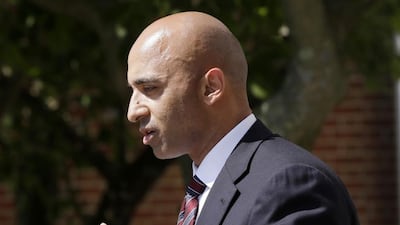Abu Dhabi // The UAE ambassador to Washington said the Trump administration should consider moving all or parts of the largest US military base in the region out of Qatar.
While moving the base is not an explicit goal of the isolation of Qatar by other Gulf countries, “if anyone asks we’d be willing to have that conversation”, Mr Al Otaiba said.
Saudi Arabia, UAE, Bahrain and Egypt have severed relations with Doha, cut travel and commerce links, and ordered most Qatari citizens to leave their countries, over their GCC neighbour’s support for a range of Islamist groups as well as its ties with Iran. Qatar denies the charge that it supports extremist militants.
Mr Al Otaiba said that “there is absolutely no military component to anything that we are doing”. But, he said, additional measures that increase economic pressure on Doha could be applied if the crisis is not quickly resolved.
“Maybe someone in Congress should have a hearing and just say, you know, ‘Should we consider moving it?’” the ambassador said in Washington on Tuesday. “And maybe not moving the entire base. Maybe just distribute to various countries so you don’t have all your eggs in one basket.”
Mr Al Otaiba said he has assured the US defence secretary Jim Mattis that the unprecedented crisis within the GCC will not affect operations at Al Udeid airbase that is Washington’s forward headquarters for its military’s Central Command, which runs operations across the region and is staffed by over 10,000 troops.
He suggested the US forces could be relocated to the UAE, which signed a new defence cooperation agreement with Washington last month that covers US military assets based in the UAE.
The base is a key factor in Qatar’s national security strategy to deter military action, and the ambassador suggested that Donald Trump should use this leverage to force Qatar to end its support for Islamist groups that the UAE, Saudi and other countries consider to be terrorist organisations.
The UAE and its allies will “fairly soon” provide a list to US officials of the specific steps they are demanding Qatar take in order for the crisis to be resolved, Mr Al Otaiba said. The specifics will fall within three broad categories: support for extremist groups and ideology; meddling in the internal affairs of neighbours; and Qatar-backed media that is used as a platform for attacking the UAE, Saudi, Bahrain and Egypt.
The ambassador’s remarks come as diplomatic efforts by regional and world powers have failed to produce a breakthrough, and as the US secretary of state Rex Tillerson attempts to spearhead a US-led mediation process in Washington.
The US administration itself is divided, with Mr Trump calling on Qatar to end its support for extremists, without coordination with the state or defence departments and contradicting Mr Tillerson, the Washington Post reported.
Mr Tillerson said last week that all Gulf countries must do a better job of cutting off funding for terrorist groups and urged all sides to de-escalate.
Asked about such calls to reduce tensions, Mr Al Otaiba said “that’s not going to happen”.
Qatari officials have also not publicly shown any willingness to acknowledge the UAE and Saudi concerns, let alone accede to them. Qatar’s closest ally, Turkey, has also heightened its rhetoric after accelerating plans to deploy more troops to its base near Doha.
On Tuesday, the state department spokeswoman Heather Nauert said Mr Tillerson and Saudi foreign minister Adel Al Jubeir “talked about the need and the agreement to come together, to work together”. She said the mood was now hopeful and that the approach of both officials “believes that the worst is behind us”.
Mr Tillerson is reportedly working to arrange talks between Saudi, Emirati and Qatari officials, potentially foreign ministers, as early as this week, but so far no plans have been announced.
Mr Trump’s personal stance backing one side may undermine his envoy’s credibility and his ability to broker a negotiations process.
A threat by the US to move its base may bring Qatar to the table ready to give concessions, but the Pentagon is unlikely to support a move, not only because it would cost a huge sum of money. A key element of the US strategic posture in the Gulf is also to locate bases in a number of countries, not one aligned bloc.
US officials, aside from Mr Trump, also refuse to call Qatar a sponsor of terrorist groups and it has not been legally designated so by the US.
Addressing a House committee earlier this week, Mr Mattis said that “we’ve obviously got shared interests with Qatar”.
He added that the US and the GCC states “all agree that the funding of any kind of terrorist group is inimical to all of our interests, and I believe that [Qatar] is moving in the right direction”.
Mr Al Otaiba said both his country and the US had allowed “bad behaviour” by Qatar to continue for “a very long time”.
tkhan@thenational.ae

